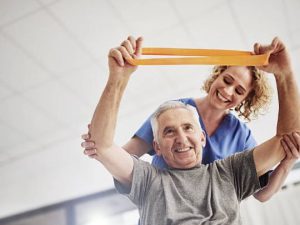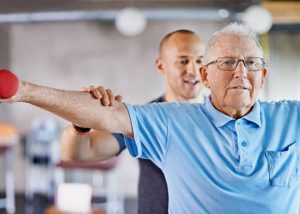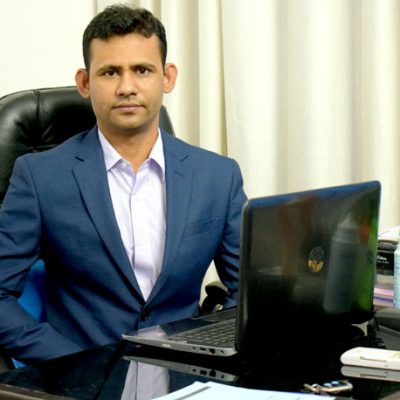The Geriatrics is the medical specialty devoted to the study of prevention, diagnosis, treatment and rehabilitation of diseases in old age or elderly, starting at 60-65 years.

The geriatric physiotherapy in Dwarka is a particular discipline of physiotherapy in Dwarka, not by the techniques employed but their modes of application and adaptation to the elderly.
The increase of the index of life makes that this type of patients is more and more numerous and in this way the adaptations of the physiotherapy are increasingly important, to facilitate the achievement or the improvement of their functional, psychological and psychomotor aptitudes.
Factors and principles of application:
– Need for early and often preventive treatment:
- Any motor deficiency, of nervous or joint origin, must receive a re-education treatment.
- The persistence of physical activity will consist of the best hygiene of life.
– The general principles of rehabilitation in the elderly, whatever the process in question, should be applied as a general measure to then apply the specific techniques corresponding to the process.
- Maintain maximum joint mobility.
- Maintain or restore independence in activities of daily living (ADL).
- Maintain or increase muscle strength.
- Achieve a good pattern of walking and balance.
- Value position.
- History of falls suffered.
- Achieve the trust and cooperation of the patient from the beginning.
– Adaptation of the individual psychology of the elderly to assimilate the elements of re-education.
– Use of a maximum of active methods and a minimum of devices and accessories, if not for occupational purposes (ergo therapy).
– Creation of a favorable psychological environment together with the necessary patience on the part of the physiotherapist.
– Enhance the habit of carrying out daily exercises and without fatigue.
– The objectives must often be modest and one of the main goals will be the reacquisition of real independence as complete as possible, considering the residual capacities of the patient.
– Criteria that may determine the degree of autonomy of the elderly person:
- Mobility (displacement possibilities).
- Functional physical independence.
- Occupation (prepare food, perform small cleanings).
- Orientation in relation to the environment.
- Economic independence.
– The domain of the application of geriatric physiotherapy in Dwarka can be applied to patients of age affected by invalidating diseases that concern the locomotor, cardiorespiratory and circulatory system; as well as to patients with psychic or psychological problems.
– The conditions related to the locomotor system are, mainly:
- Rheumatic degenerative(osteoarthritis, osteoporosis) or inflammatory (arthritis) affections.
- Hemiplegia.
- Fractures(humerus neck, hip).
General indications:
– The objectives will aim at the prevention of accelerated or inharmonic aging of too fast degradation of the functional aptitudes, having to act on:
· Respiratory system:
- Control exercises and regularization of breathing: Wide and controlled ventilation.
- Avoid abdominal restraints that increase pressure, fight against defective positions, obesity and prolonged stay in bed.
- Locomotor system: The possibilities of locomotion condition the life of relationship and communication of the elderly; many factors influence the locomotion of the elderly:
a. Joint state
- Degree of bone mineralization (Osteoporosis).
- Associated neurological damage.
- Cardiovascular and pulmonary state.
- Sequelae of traumatisms.
* Among the measures that we have to improve the locomotor system are:
- General circulatory and/or lymphatic massage(do not return to the patient dependent on this treatment).
- Active mobilizations, self-assisted exercises, individual and collective gymnastics.
- Functional exercises that insist on lateral and oblique displacements in association with stimulation of visual control (use of objects in movement and of colored and luminous references).
- Stimulation of balance: the importance of the oculomotor system and cervical mobility.
- Muscular activity, especially static, with resistance equal to 50% of maximum resistance (RM).
- Physical means (thermotherapy, hydrotherapy).
- Teaching a correct life regime.
- Fight against the fear of falling(balance) and learning to “get up off the ground”.
- The practice of adapted sport or functional gymnastics that pursues:
- Simple movements.
- Diversity of exercises.
- Functional and utilitarian character.
- Progressive adaptation to an always tolerable effort.
- Frequent periods of recovery and relaxation.
Psychological factor:
- Help the patient to preserve and even develop a better psychic concept.

Aging and its impact on the locomotor system can cause difficulties during activities of daily life, simple advice and the use of technical aids (cane, crutches, walker) can be secondary to the elderly in their desire for conservation or recovery of autonomy These technical aids can solve numerous problems due to joint mobility deficit, lack of strength and coordination and visual disturbances.
What exercises can be done?
- Exercises to control and regulate breathing.
- Teach to avoid defective positions, weight gain and staying in bed.
- Perform circulatory and/or lymphatic massages.
- Develop active mobilizations.
- Perform functional exercises related to visual stimulation and focused on lateral and oblique displacements.
- Stimulate the balance
- Increase muscle activation
- Use physical techniques such as hydrotherapy.
- Teach healthy habits
- Perform exercises for the prevention of falls decreasing fear and learning to “get out”.
- Practice adapted sports characterized by:
- Simple activities
- Variety.
- Practicality
- Progressively adapt the effort.
- Frequent cycles of recovery and relaxation.
In Dr. Sarwar Physiotherapy Center in Dwarka, we know how to deal with the treatment of elderly patients and help them to conserve, improve and recover the psychomotor condition. Among the activities that can help reinforce the manual treatment, we have postural control, physical conditioning.

